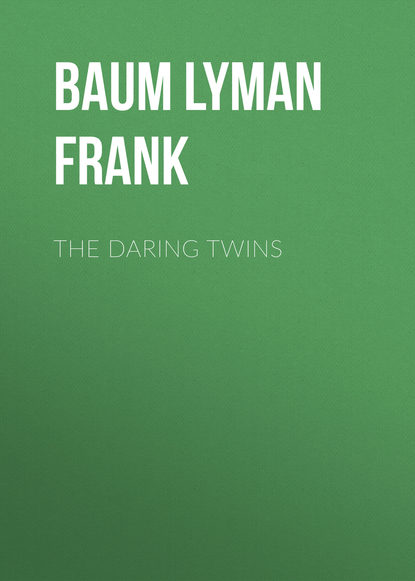По всем вопросам обращайтесь на: info@litportal.ru
(©) 2003-2024.
✖
The Daring Twins
Настройки чтения
Размер шрифта
Высота строк
Поля
CHAPTER XXVI
THE WATERMARK
Phœbe found the chickens had not been fed, and they were making a plaintive outcry for attention. She went to the stair and called to Elaine, but there was no reply.
Slowly ascending to the upper floor she pushed open the door and called again. Then something about her grandfather’s awkward position attracted her attention. She crept forward to peer into his face; then started back with a cry of dismay. Her grandfather was not there. A pillow and a bolster supported the dressing gown and head-shawl which had so cleverly deceived her.
Hurrying down she met Phil and Judge Ferguson coming up the walk. They told her to get Cousin Judith, and when the four were assembled in the quaint old parlor the girls heard the extraordinary story of Elaine’s arrest and Eric’s forgiveness.
Miss Halliday made a desperate fight for Jonathan Eliot’s money. Judge Ferguson was not the only lawyer in Riverdale. Among the others was a little, fat, bald-headed man named Abner Kellogg, whom the court allowed to defend the woman.
Kellogg was shrewd, and Elaine promised him a big fee if he won; so he challenged Mr. Ferguson to prove that the deed of gift was a forgery and had not been signed by the deceased miser.
This was a difficult thing to do. The signature was very much like Mr. Eliot’s; so like it that the experts would not state positively that he had not affixed it to the deed. Moreover, Elaine’s contention that she had received no regular wages for years; that she had been the only close friend and confidant of the old man, and that he had promised her his money and property, when he died, as a return for her faithful service, was all so plausible that it greatly strengthened her claim.
She testified before the court that Jonathan Eliot had executed this deed of gift just before he was stricken with paralysis.
“He would not give me the paper then,” she explained in a logical, composed way, “but kept it in an iron box in his secret cupboard. He told me that when he died I could take the paper, and it would prove my claim. So I did take it, and showed it to Phœbe Daring, and she gave me back the money she had stolen from me.”
When asked why she had concealed the fact of Mr. Eliot’s death for three days and hidden his body and the money in the tomb, she replied that she was afraid of the Darings and their lawyer, Judge Ferguson. The Darings had stolen from her and the judge had threatened her with the law. She was a simple, inexperienced old woman, she added, unable to oppose such bitter and powerful enemies, who had always treated her unjustly. She feared that when they knew of Mr. Eliot’s death they would take away her money – as indeed they had done – and so she had tried to keep the matter secret until she could get far away from Riverdale. She had intended to let the Darings have the house, although it was clearly her own. The place had grown distasteful to her, and the money would enable her to live comfortably in some other part of the country.
She flatly denied her attempt to entomb Mr. Ferguson, the constable and Toby Clark, which had been frustrated by the boy sacrificing his foot for their lives, and they refrained from pressing this charge against her. Toby’s foot was healing, but he would be a cripple as long as he lived.
Taken all together, Elaine’s position was far more strong than Mr. Ferguson had anticipated. By permission of the court he examined the deed of gift closely, afterward complaining that the paper seemed too new to have been written upon three years ago. It was a heavy, thick sheet, resembling parchment, and on it the judge discovered a watermark consisting of the letters “A.R.”
Lawyer Kellogg, who defended Elaine, replied that paper kept away from light and air, as this had been, would remain white and look new for years, and therefore Mr. Ferguson’s contention was ridiculous. The court agreed with Mr. Kellogg in this, and poor Mr. Ferguson was at his wits’ end to find some reasonable flaw in the document.
The case had been on trial for a week, and had been adjourned over Sunday. The Darings and Cousin Judith, who had at first been elated at the prospect of inheriting Gran’pa Eliot’s wealth, had by degrees fallen into a state of hopeless despondency.
After his Sunday dinner Judge Ferguson came over for a talk with his clients, and although his intention was to cheer them, his own face was too serious to be very assuring.
“I am morally certain that woman is deceiving us,” he said; “but I must confess my fear that we shall be unable to prove the deed a forgery.”
“Never mind, sir,” replied Phil, smiling at Phœbe to give her courage; “we’ve managed to get along so far without gran’pa’s money, and I guess we can stand it hereafter.”
“That isn’t the point,” suggested Judith. “The money is rightfully yours, and you are entitled to it. Why, the fortune left by my uncle is nearly a hundred thousand dollars, counting the money and securities alone. Surely Elaine Halliday cannot claim her services to be worth all that!”
“Not justly, my dear,” answered the judge; “but the law will not look at it from that point of view, and here is a point of law to be considered. If the deed is allowed to stand we cannot prevent Elaine from getting every penny, and the house to boot. If it is a forgery, and so proved, she is not entitled to a dollar beyond her wages as housekeeper. Even that would be forfeited by her deception.”
“Suppose,” said Phœbe, “we compromise, and agree to give her all the money if she will let us have the house. Wouldn’t that be better than getting nothing at all?”
“I fear it is too late to compromise,” said the judge, shaking his head regretfully. “At first we might have made such an arrangement, but now that pettifogger Kellogg will insist on her getting everything. Elaine has wisely left her defence entirely in Kellogg’s hands.”
“Isn’t he a rascal?” asked Cousin Judith.
“I would not accuse him of rascality,” was the reply. “No; Kellogg is not a bad man, nor a bad lawyer; he is doing his duty by his client, that is all.”
Just then Becky came rushing across the lawn, screaming and laughing. She was closely followed by Don and Allerton Randolph, who tried to head her off. Becky was clutching and waving a paper, and she ran up to Cousin Judith, who sat beside the judge, and thrust the paper into her hand, crying:
“Don’t let ’em have it, Little Mother – promise you won’t!”
“But what is it?” asked Judith, glancing at the paper and then smiling.
“Allerton drew it, just for us,” said Donald, flushed and angry, “and Becky grabbed it and ran away. Make her give it back, Cousin Judith – Allerton doesn’t want anyone to see it.”
“But it is quite clever,” replied Judith, still smiling. “I did not know you were so good an artist, Allerton.”
“I am not very clever, Miss Eliot,” replied Allerton, in his sedate way. “Mother thinks I am artistic, and encourages me to draw; but she does not like me to make cartoons, such as this, for she says it degrades my talent.”
“H-m. Let’s see the cartoon,” said the judge.
“May I show it to Mr. Ferguson, Allerton?”
The boy hesitated.
“If you wish to, Miss Eliot,” he said.
The judge took the paper, put on his glasses, and after a glance laughed heartily. It was a caricature of old Miss Halliday, executed with considerable humor and skill, considering the artist’s youth.
Suddenly the judge gave a start and the paper trembled in his hands.
“Bless my soul!” he cried, holding it to the light. “What’s this?”
“That?” said Allerton, leaning forward. “Oh, that is the watermark of my initials, ‘A.R.’ The drawing paper was especially made for me, as a Christmas present.”
A silence fell upon the little group. Mr. Ferguson, Phœbe, Phil and Cousin Judith eyed one another by turns, and in every eye gleamed the certainty that Jonathan Eliot’s fortune was saved to the Darings.
“When did you receive such a fine present, Allerton?” asked Phil, his voice trembling in spite of his efforts to control it.
“At the last holiday season,” answered the boy readily.
The old lawyer turned a delighted face to the eager group.
“Your grandfather has been paralyzed three years!” he exclaimed.
“Tell me,” said Phœbe to Allerton, “did you ever give Miss Halliday any of your paper?”
He took time to think; then his face brightened and he replied:
“Only one sheet. She begged me for it one day when she brought the eggs.”
“And when was that, my lad?” inquired Mr. Ferguson.
“A month ago, perhaps.”
* * *
Mr. Kellogg threw up Elaine’s case in disgust, and would have nothing more to do with it. When the deed of gift was proven a forgery and old Miss Halliday was told she must go to prison unless she confessed, she finally broke down and admitted the truth. Being aware of the fact that no one save herself knew of her master’s hoarded treasure, she planned to get it for herself. After practising his handwriting for months she became so expert that the deed she finally executed deceived even the experts. Had it not been for the telltale watermark upon the paper she would have easily won.

















